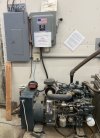Hawk
Well-Known Member
Resurrecting an old thread.
I've sat on my ass and have not bought anything to date. Too many options!
Wife said she would like the whole house wired, so if I'm not here, she doesn't have run extension cords or get in the attic to power the furnace fan.
I'm thinking a 10,000 peak watt unit, dual fuel.
I'll have an electrician wire an inside line and switch from our breaker box to an outside box, like one at an RV park, that we can just plug a big extension chord into.
She'll have to throw the main breaker in our breaker box, to get us off main power, and throw the other switch to access the generator power.
Then she will have power to the whole house. I don't know if 10,000 watts will power the 5 ton A/C, but it should handle everything else. We will just be frugal with what we turn on.
She knows she can't run the ovens or dryer, the only other 220 appliances, because of draw on the generator. Water heater, stove and furnace are natural gas. We just need power to the blower motor to run the furnace .
I don't want to buy an inverter generator.
I would like an inline voltage conditioner. I was wondering if this device would work to clean the voltage up enough to power the electronics, which includes the TV, refrigerators, microwave and computers, without running the risk of blowing out the electronics, due to voltage fluctuations. Replacing a big TV, couple of refrigerator and microwave would hurt my feelings.
I don't know if this is an external line conditioner or not, but it is a lot cheaper than an inverter generator.
Maybe someone else has an idea of an inline conditioner.
Some of you RV guys might have experience with something like this.
Any advice would be greatly appreciated.
I've sat on my ass and have not bought anything to date. Too many options!
Wife said she would like the whole house wired, so if I'm not here, she doesn't have run extension cords or get in the attic to power the furnace fan.
I'm thinking a 10,000 peak watt unit, dual fuel.
I'll have an electrician wire an inside line and switch from our breaker box to an outside box, like one at an RV park, that we can just plug a big extension chord into.
She'll have to throw the main breaker in our breaker box, to get us off main power, and throw the other switch to access the generator power.
Then she will have power to the whole house. I don't know if 10,000 watts will power the 5 ton A/C, but it should handle everything else. We will just be frugal with what we turn on.
She knows she can't run the ovens or dryer, the only other 220 appliances, because of draw on the generator. Water heater, stove and furnace are natural gas. We just need power to the blower motor to run the furnace .
I don't want to buy an inverter generator.
I would like an inline voltage conditioner. I was wondering if this device would work to clean the voltage up enough to power the electronics, which includes the TV, refrigerators, microwave and computers, without running the risk of blowing out the electronics, due to voltage fluctuations. Replacing a big TV, couple of refrigerator and microwave would hurt my feelings.
I don't know if this is an external line conditioner or not, but it is a lot cheaper than an inverter generator.
Maybe someone else has an idea of an inline conditioner.
Some of you RV guys might have experience with something like this.
Any advice would be greatly appreciated.


